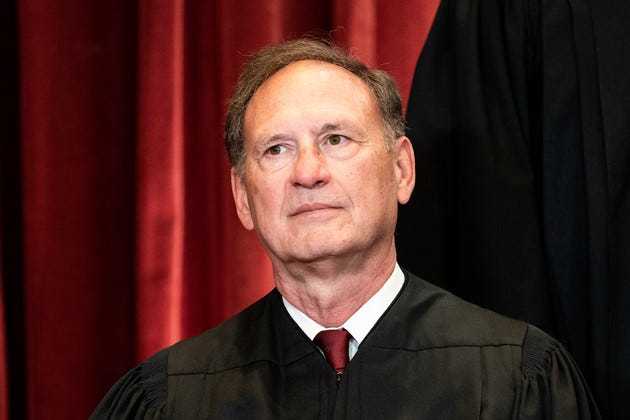Is Justice Alito “Legislating from the Bench”?
Far from an exercise in judicial force of will, Alito's leaked draft would be a surrender of will from the courts back to the people.
One of the most fundamental definitions of tyranny is arbitrary rule. So, I can understand the response of many to Justice Alito’s leaked draft from the perspective that it feels arbitrary. But a wider gaze of the history of constitutional law demonstrates that, if the draft does indeed become the majority opinion, it's a blow against judicial legislation rather than a product of it.
The proper role of a Judge is to be an interpreter, to offer judgment. The foundation of American rule of law is the text of the Constitution or the will of the people when the Constitution or the traditions of natural law are silent. When a Judge supplants the law with his/her will, it is tyranny. In my study of constitutional law, three cases have stood out to me as the most egregious demonstrations of this tyranny: Dred Scott v. Sandford, Plessy v. Ferguson, and Roe v. Wade.
In each of these cases, the court arbitrarily applied extra-constitutional reasoning to deny fundamental humanity and freedoms to a group of people considered outside the bounds of our nation's political compact to protect life, liberty, and the pursuit of happiness. The first two involved slaves and their descendants, and the last involved unborn children.
Luckily, we have a constitutional system where stare decisis (respect for precedent) is an important and prudential principle but stare scriptum (respect for the written law) is the grounding rule of jurisprudence. In our system, no judicial determination is ever final so long as an argument exists that the determination violates, supplants, or ignores the provisions of the Constitution. Constitutional law is not simply comprised of precedents, it's comprised of the arguments for and arguments against those precedents (I have had many professors whose curriculum ensures their students study dissenting opinions as rigorously as majority decisions).
Constitutional law is an ongoing conversation, debate, and dialectic on what the reasonable interpretation of the Constitution is. This ongoing conversation, from time to time, has led the courts to reverse judicial precedent when the arguments against its constitutionality come into sharp focus. And, sometimes, the conversation turns on the will of the people when consensus is reached and new ideals are enshrined by amending the Constitution itself.
Dred Scott, which claimed slavery was constitutional and denied that slaves or their descendants (even if freed) had any claim to the inalienable rights protected by the Constitution was overturned, not by the courts, but by the voice of the people with the adoption of the 13th and 14th Amendments.
Plessy, which argued that segregation was "separate but equal" and claimed Jim Crow was constitutionally permissible, allowed a system of second-class citizenship for African Americans to perpetuate for generations before the court correctly overruled Plessy in Brown v. Board of Education (separate is inherently unequal).
Roe v. Wade reached into the Constitutional text and conjured up what it claimed was a constitutionally protected right that is neither evidenced in the document nor demonstrated in the history of western society. In a matter where text and tradition were silent, the court arbitrarily substituted its will for the will of the people. Roe v. Wade shot down the abortion laws of no less than 46 states. It wrested the power to make law on the issue from the people and it robbed the people of the ability to work the issue out in the public square with fear and trembling.
And, most disturbingly, Roe joined the ranks of egregious decisions such as Dred Scott and Plessy in deciding that the interests and rights of one class of people are preeminent while the interests and rights of another class of people are excluded from the political compact. In deciding that the right of privacy, and by extension a "right" to abortion, is inviolate, the necessary debate over the humanity of unborn life and whether such life also deserves due consideration for a claim of inalienable rights was barred from even taking place in the halls of our government.
If Justice Alito's draft becomes the majority decision, then what will be taking place is the farthest thing from judicial legislation. Roe v. Wade was, as Justice Byron White declared in dissent to the court’s decision at the time, “an exercise of raw judicial power.” If the court chooses to reverse that ruling, it will be an important and profound decision to put things right where the court once went terribly wrong.
Justice Alito's opinion is not an exercise of will over the law but a return to law, and the surrender of will. It's a return of power to the people, who would then be allowed the ability to engage in debate, discussion, and consideration which will, in turn, lead to laws in the states that will reflect the will of the people on the issue. And, perhaps, in the future, we can reach a consensus and enshrine whatever that consensus is in the Constitution itself.
Justice Alito's leaked opinion would be a coup de grace against judicial legislation's most perfidious and insidious standing example. Overturning Roe v. Wade would empower the people, empower state sovereignty, allow for many states to protect and cherish unborn life, and would help rebuild the dignity of the judicial branch. The Supreme Court should have never supplanted the role of the public square, the free market of ideas, or the people's exercise of their right to choose their path on matters not addressed in the text of the Constitution or enshrined in the traditions of natural law.



